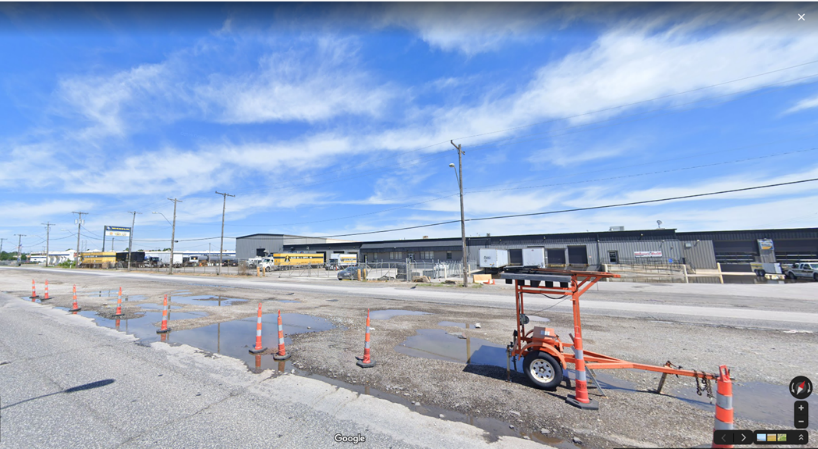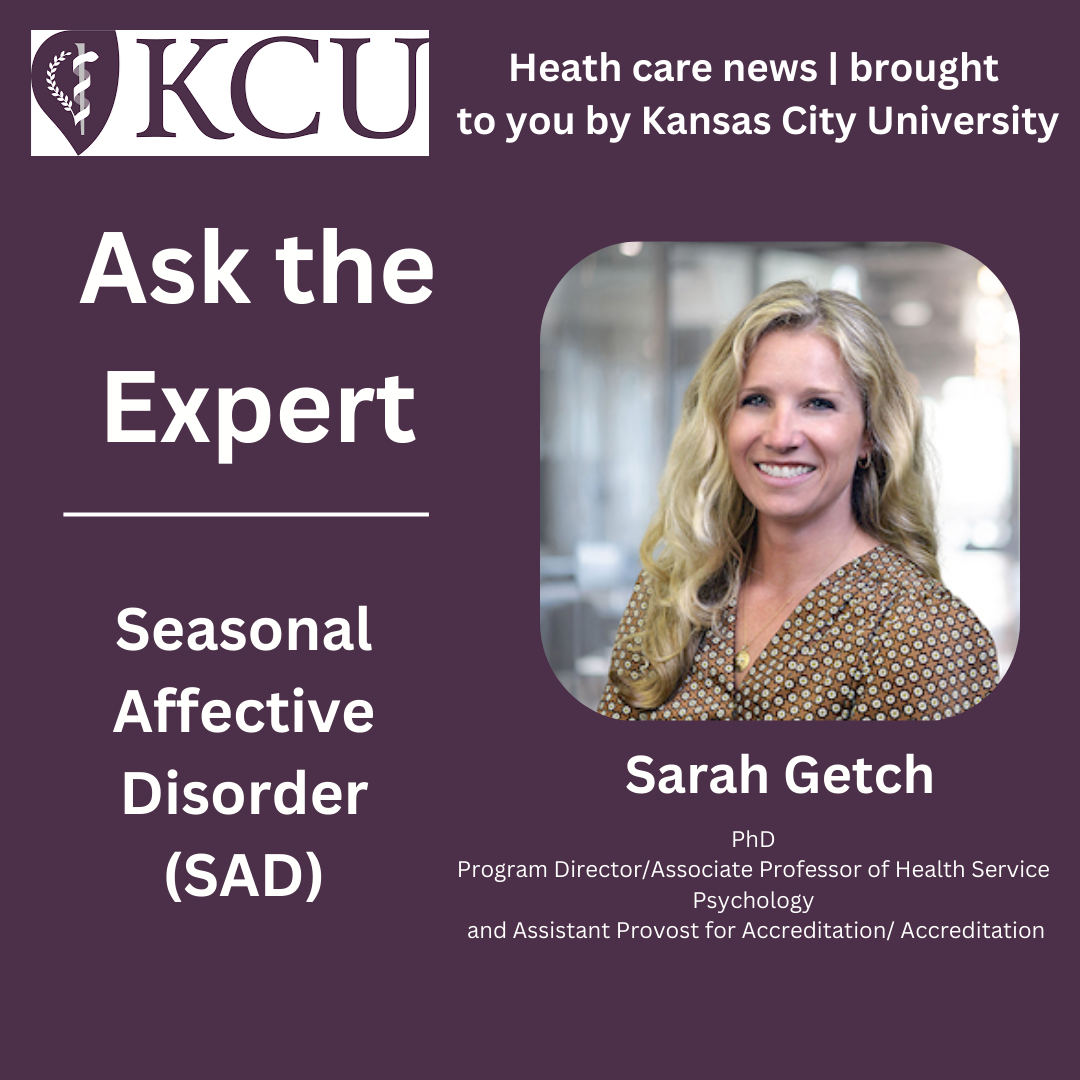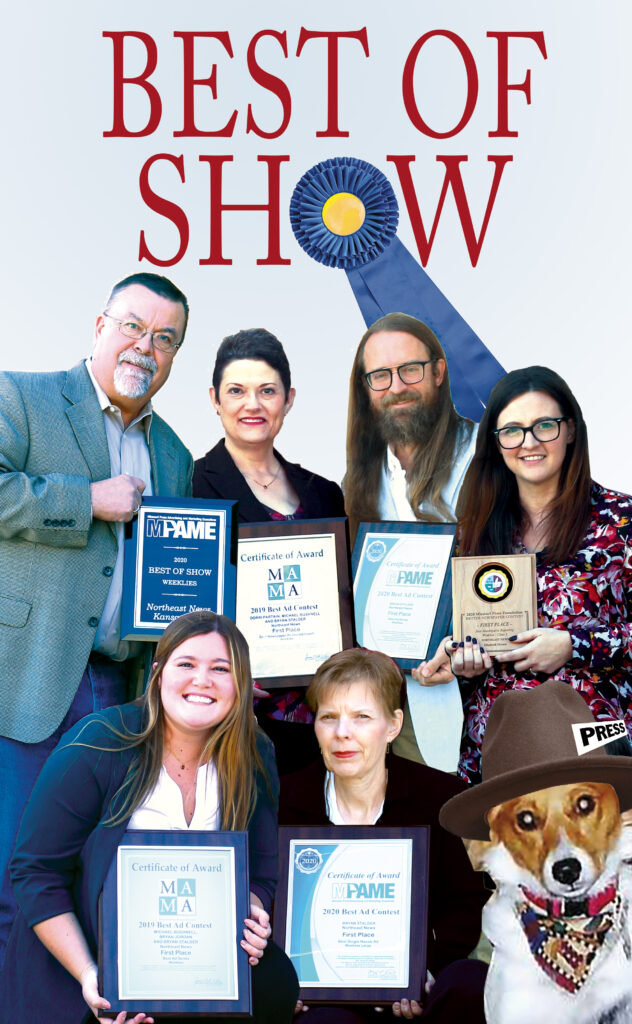
This week, the Northeast News staff is taking a look back at 2020 and sharing some of the most important things we covered in Historic Northeast, and Kansas City, this year. We focus on heavy topics like homelessness, COVID-19, racism and crime. We also focus on the good: the Chiefs Superbowl victory, neighbors and organizations who assisted others, feature stories on residents, and how we adapted.
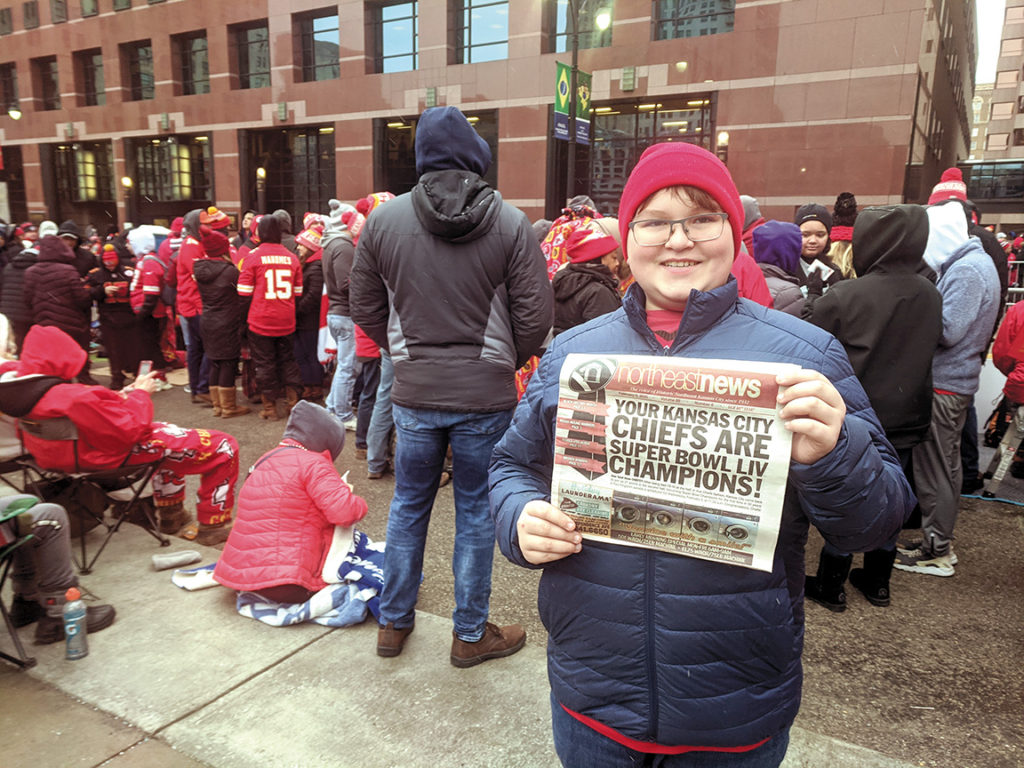
SUPERBOWL
2020 has been a turbulent year, but as presidential impeachment dominated national headlines, and the threat of COVID-19 wasn’t fully understood or realized, Kansas City was focused on their NFL team, the Kansas City Chiefs, heading to the SuperBowl for the first time in 40 years.
Many Chiefs fans, including Mayor Quinton Lucas, made the trip to Miami, Fla., to attend the game. After a competitive first half, the San Francisco 49ers celebrated a premature victory in the end zone when they took a 20-10 lead late in the third quarter. However, star quarterback Patrick Mahomes rallied in the fourth quarter with a touchdown pass to Travis Kelce and another two touchdown passes to Damien WIlliams, delivering the Kansas City Chiefs an exciting come-from-behind 31-20 win.
On Wednesday, Feb. 5, Chiefs fans gathered in the streets of downtown Kansas City in 27 degree temperatures to celebrate the home team’s victory; a last hurrah before bracing for the rocky times ahead.
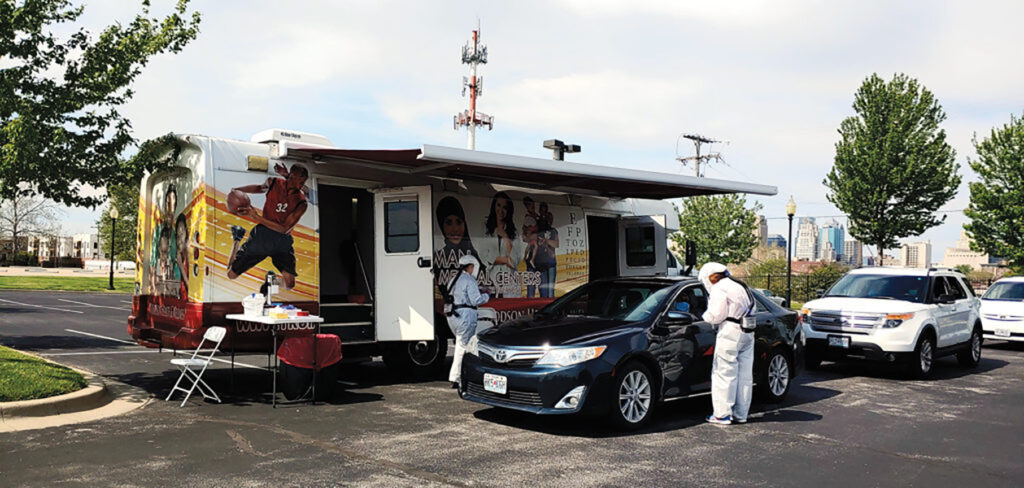
COVID-19
For at least the past nine months, COVID-19 has affected some aspect of everything we do as a community.
The Northeast News published its first article about COVID-19 on March 9, 2020. Editorial Assistant Kalie Strain explained that it was a novel coronavirus disease that originated in Wuhan, China at the end of 2019. Kansas City did not yet have any confirmed cases. Director of Health Dr. Rex Archer at the time said the virus had no treatment and that four out of every five people would heal at home.
On March 12, Kansas City Mayor Quinton Lucas declared an initial 21-day State of Emergency throughout the city as COVID-19 began to spread through the community. All events with more than 1,000 attendees were cancelled or delayed, and a moratorium was placed on non-essential travel for City employees. Archer advised social distancing, washing hands, covering coughs, avoiding handshakes and staying home if ill. Then-Managing Editor Elizabeth Orosco reported that the North-East Library removed access to public computers at its interim location on March 13. Just two days later, the Kansas City Public Library closed all 10 of its locations.
Orosco spoke with doctors from KC Care Health Center and Kansas City University for an article published March 13 explaining COVID-19, symptoms, origin, risk factors, spread, protection and early forms of testing.
On March 16, Lucas updated the State of Emergency, imposing a 10 person limit on gatherings, closing schools on March 18, transitioning restaurants to carry out or delivery only, advising all non-essential employees work from home, turning away visitors from long term care facilities, and asking households to self quarantine following positive test results.
Following that update, Kansas City Public Schools (KCPS) initially cancelled classes through April 3. KCPS began offering sack lunches and meal kits on March 24, distributing work packets via mail and online. KCPS did not return to the classroom in the Spring 2020 semester.
After imposing an Executive Order declaring a State of Emergency, Missouri Gov. Mike Parson announced that April 7 municipal elections would be postponed until June 2.
On March 19, the Neighborhood and Housing Services Department postponed clean-ups through April 3, suspended in-home inspections, closed offices, and implemented social distancing measures within the department.
Lucas issued a “Stay at Home” order for the city that took effect March 24, requiring Kansas Citians to stay home and extending school closures through April 24. Only essential businesses like grocery stores, pharmacies, gas stations and healthcare facilities remained open under the order. Kansas City police and fire departments addressed questions regarding COVID-19 following the announcement. KC Parks closed playgrounds and courts that same day, but socially distant outdoor activity and exercise were encouraged. Other departments like RideKC and the health department modified their services, as well.
On March 26, Governor Parson signed an executive order mobilizing the Missouri National Guard to help with the COVID-19 response. One day later, the FDA took action to increase the U.S. supply of ventilators and respirators for the protection of healthcare workers and patients.
At the end of March, Orosco reported that the Missouri Child Abuse and Neglect Hotline saw a 50% drop in calls. Publisher Chris Adams wrote an editorial on students learning at home from the perspective of a lifelong educator.
As Kansas Citians settled into what they didn’t yet know was the new normal, small businesses adjusted and searched for relief. Neighborhood tax preparers and healthcare professionals offered online services, and by the end of March, both KCFD and KCPD recorded their first COVID cases.
The first death in Kansas City from COVID-19 was confirmed on April 2. The city had 143 positive cases at the time. On April 4, healthcare organizations across the state began urging Parson to issue a statewide “Shelter-in-Place” order. He did on April 6 when Missouri had 2,113 positive cases.
On April 2, the City Council unanimously approved a contract that would pay $80,000 to provide up to 30 rooms at the Rodeway Inn at The Paseo and Admiral Blvd. for unhoused people experiencing symptoms of COVID-19 to prevent the spread of the virus through camps and shelters.
On April 4, KCFD EMT Billy Birmingham passed away, the first Kansas City first responder to succumb to COVID-19. Since then, two other KCFD employees have died of COVID-19.
Relief, though hard to access for some, began flowing into Kansas City’s health centers and small businesses, we reported in our April 8 issue.
Mayor Lucas extended the citywide stay-at-home order on April 16 through May 15 and discussed Kansas City’s response to the pandemic. By April 27, free COVID-19 testing sites began popping up throughout the city for residents.
A glimmer of hope as summer neared, the City announced a phased 10-10-10 reopening plan for May 15. It limited businesses to 10% occupancy, sign-ins for visits longer than 10 minutes, and 10 people or less at social gatherings, or 50 if outside.
KCPL began reopening by allowing patrons to pick up holds on May 19, the same week that Lucas urged the Jackson County Legislature to enable Kansas City to receive funding from the county’s CARES Act funds.
By May 31, Lucas had extended the city’s Emergency Order with updated guidelines that govern how residents and businesses reopen in compliance, including 50% capacity, maintaining six feet of distance, masks for service providers and accommodations for employees with health concerns.
As the pandemic raged on, the City began facing budget concerns, asking departments to consider where cuts could be made.
On June 29, another round of mandates went into effect, this time requiring face coverings in any places of public accommodation where six feet of distance can’t be maintained. RideKC distributed masks to riders in response. In the same update, percentage capacity limits were eliminated, except for at bars and restaurants.
On July 7, we reported that COVID-19 was impacting KC Parks staff and operations. In the middle of July, the citywide mask mandate was extended indefinitely and remains in place as the year comes to a close. Ahead of the August 4 primary, absentee voting was expanded in Missouri to allow for those who have contracted COVID-19 or are in the at-risk categories.
Schools discussed reopening plans as the fall semester approached, and some hosted drive-through graduation ceremonies. Ultimately, Mayor Lucas recommended delaying the start of the school year until after Labor Day on September 8. By August 11, KC Park was offering up community buildings as virtual learning sites for students. Many schools, including KCPS, started the year with distance learning, and many more have reopened, and closed, in-person learning since then.
Editorial Assistant Daisy Garcia Montoya reported in Spanish on COVID-19, sharing resources and updated, accurate information with the community in the August 5 issue.
On September 28, the Scarritt Renaissance Neighborhood Association formally cancelled its annual Scare-It Halloween event, one of many community activities greatly modified or scrapped altogether.
Residents of Kansas City were surveyed on the city’s response to COVID-19 and operations at the end of September. With budget cuts still looming, Chief of Police Rick Smith said ‘devastating’ budget cuts would further reduce personnel and services.
Fast forwarding to November, public health departments in the Kansas City metro area called on residents to fight the spread of COVID-19 as cases surged. On November 16, Lucas announced updated restrictions, once again limiting indoor gatherings to 10 people, closing restaurants and venues at 10 p.m. and requiring social distancing and imposing 50% occupancy, and requiring masks. Health officials recommended cancelling holiday plans.
RideKC modified services on November 17, this time due to COVID related staffing shortages.
Missouri Gov. Mike Parson announced a COVID-19 vaccination website on November 24, while healthcare unions throughout the state called for him to impose a mask mandate.
On November 25, Lucas proposed waiving operating fees owed to the city for struggling local businesses. By December 2, municipal court once again moved online due to an increase in COVID-19 cases.
On Monday, Dec. 14, the first doses of the Pfizer-BioNTech COVID-19 vaccine arrived in Kansas City and were administered to healthcare workers at Truman Medical Center. Since then, the Moderna vaccine has also been approved for emergency use.
KCFD shared an update on COVID-19 within the department for our December 16 issue, including staffing shortages and updated protocol. Although three KCFD employees and others across the state have died of COVID-19, firefighters and EMS workers were not scheduled to be included in the first round of vaccines, causing pushback.
However, with initial vaccines being administered in Kansas City comes the hope of moving back toward normal life for many in the metro area as we approach 2021.
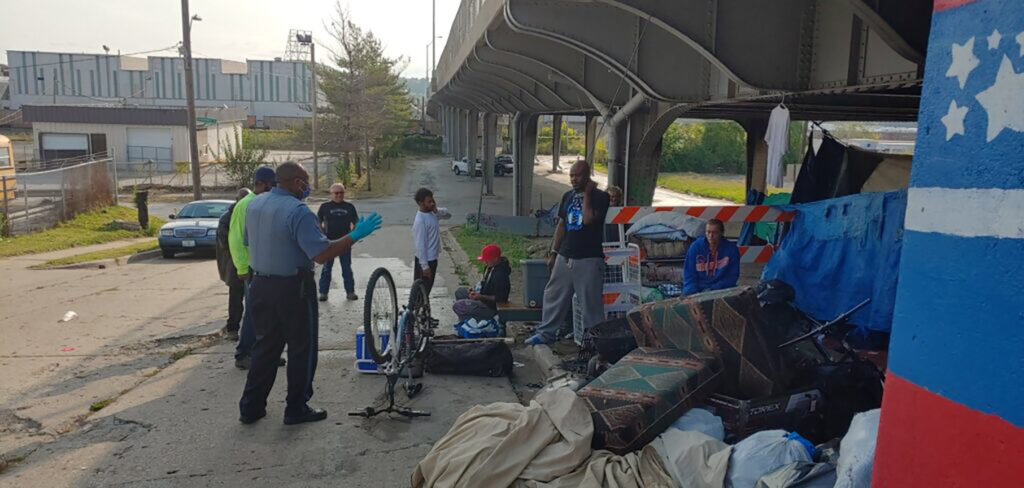
HOMELESSNESS/HOUSING
Some Northeast residents, and many throughout Kansas City, have struggled to find affordable, safe housing for years, and that was only made harder by the indirect effects of COVID-19.
In January, U.S. Representative Emanuel Cleaver II (D-MO), along with a group of 16 lawmakers called for the Department of Housing and Urban Development (HUD) to reconsider proposed actions related to down payment assistance programs that could have severe consequences for low to moderate income and minority Americans.
Through a partnership between the city and NEAT (Northeast Alliance Together) at the Mattie Rhodes Center, Illegal Dumping Investigator Travis Silvers was assigned to the Northeast area three days a week to address illegally dumped trash and residential issues.
As part of that effort, one of Silvers first actions was working with a landlord-tenant eviction in the 100 block of Cypress Avenue. Acting on neighbor complaints, Silvers ensured the almost block-long pile of trash was cleaned up within 24 hours.
In February, the Northeast News reported ReStart had begun phasing out its emergency shelter beds because of a lack of available funding. ReStart’s emergency shelter had a total of 90 beds but as of February 27, they were down to around 50 beds. ReStart’s emergency shelter was used by an average of 375 single adults annually and people typically stay for three months. Unlike other local shelters that operate on Christian beliefs, ReStart is one of the only inclusive to LGBTQ+ people seeking shelter, joined by nearby Benilde Hall and Sheffield Place.
In his inaugural State of the City address, Mayor Quinton Lucas discussed city infrastructure, potholes, affordable housing, zero-fare transit, marijuana offenses, and public safety. Lucas highlighted the efforts by KC Tenants to advocate for tenant’s rights across Kansas City.
“The Tenants Bill of Rights was a transformative piece of legislation… but we have a lot more work to do,” he said.
Mayor Lucas said his office worked for six months to find more resources to support the creation of affordable housing opportunities.
“That work has resulted in an amazing $13.9 million in regional funding for local programs serving the homeless, as well as deploying millions in additional HUD funding to build new affordable housing units, provide needed building maintenance to senior centers and women’s shelters, and help hundreds of low-income homeowners make needed repairs—in every part of Kansas City.”
Progress on the much heralded Paseo Gateway project continued to move forward in 2020, albeit at a glacial pace. Throughout 2020, the site has seen great change, especially since all of the aging brick structures have been demolished.
In February, Emerging Builders, a Northeast based construction apprenticeship program teamed up with Northeast neighbors to save and repurpose the playground equipment at the Chouteau Courts public housing site.
In the midst of the demolition and with the blessing of the city’s Housing Authority, volunteer crews successfully de-installed and moved the equipment from the site to a storage facility on the campus of Kansas City University. According to Pendleton Heights President Chris Binkley, the equipment remains in storage until a location for the equipment can be determined and funds can be secured for its permanent installation.
In March, we covered two separate rallies at city hall led by KC Tenants, a local advocacy group for area renters. Both rallies were the result of the City Council passing a Tenants Bill of Rights three months earlier, in December 2019. The ordinance was passed in order to enforce existing tenants rights and listed additional tenant protections such as protection from landlord retaliation and notification to the tenant prior to a landlord or property manager entering an occupied unit. The ordinance established a Rental Housing Assistance Unit in the newly created Division of Housing and Community Development that would educate tenants on their rights and resources. The legislation also established a Rental Housing Center to mandate regular updates to the Landlord-Tenant Bill of Rights, enumerating legal protections.
In June, after learning of the plight of residents at Gabriel Towers, a senior housing apartment tower at 1600 Jackson Avenue, a number of local assistance agencies sprang into action after learning the residents of the complex had been without air conditioning for weeks. KCPD and RideKC stepped up and provided cool water, doughnuts and additional food to residents who found conditions outside in the shade better than inside the sweltering building. RideKC also provided cooling buses for residents.
Residents stated that the building had roaches and bed bugs, and was beset with mold in a number of the units. KC Tenants also assisted in unionizing Gabriel Towers residents in order to present a list of demands to the building’s management company, Millennia. Air conditioning was restored to the facility three or four days after meeting with management.
Additionally, the backed up trash chute and mold issues were addressed.
In September, City health inspectors, working with the CID, KCPD fire inspectors, City codes inspectors, the Scarritt Neighborhood and NEAT, shuttered a chronically crime-ridden apartment building at 3516 Independence Avenue. As officials were entering the building’s front door, drug dealers and prostitutes fled quickly from the back door. Citing “imminent threats to the tenants due to the existing electrical situation in the building,” fire inspectors ordered the building vacated and boarded up. The building remains boarded up and vacant at the time of this writing.
In late September, Silvers, again acting on a neighbor’s complaint, worked with KCPD and the Independence Avenue CID, twice moving a problematic and persistent transient camp from the 500 block of Lawndale Avenue. Those displaced were offered housing services through KCPD social workers, but by and large, opted to move on to a less visible location. Less than a week later, the same camp was visited by KCPD and city inspectors and moved again as it was re-occupied after the initial clean-up.
In June, 56 homeless Kansas Citians tested positive for COVID-19 and were promptly moved to the Rodeway Inn at 1409 Admiral Boulevard. The city contracted with the motel after Mayor Quinton Lucas introduced an ordinance in April setting aside $80,000 in city housing funds dedicated to housing the city’s COVID-19 afflicted homeless population at the hotel. As of June 24, roughly $38,000 had been billed to the City by the motel. Since self isolating at the motel, all 56 who had tested positive, tested negative and were checked out of the motel. ReStart also partnered with the motel and the city to provide clothing and food to the residents during their stay.
In August, the City’s Neighborhood and Housing Services Department partnered with Legal Aid of Western Missouri to offer the first Landlord-Tenant University session. Citing a high number of “cost burdened” renters, the four-hour session held at the city’s Health Department at 4400 Blue Parkway on August 6 focused on a number of topics including fair housing practices, housing code enforcement and illegal dumping enforcement. The action was an outgrowth of a Tenants Bill of Rights ordinance that passed out of the city council in December 2019.
In August, NEAT broke ground on a “net zero” sustainable home at 133 N. Topping Avenue. Partnering with K-State’s School of Architecture and Emerging Builders, the new home is being constructed on the former Land Bank of Kansas City lot purchased specifically for this project. Delays have hampered the project due to COVID restrictions, but the project is proceeding and is slated for a first quarter 2021 completion.
As part of the mandated effort to replace the subsidized 134-unit Chouteau Courts housing project, Choice Neighborhoods awarded HAKC (Housing Authority of Kansas City) a $6.4 million grant to demolish the old Extended Stay motel at I-35 at Antioch Road in Clay County and build a 66-unit public housing project consisting of six, two-story townhome style buildings to be built on the 4.4 acre site. The location is the third such location considered for unit relocation of the Chouteau Courts project. The first two, one near Worlds of Fun near NE 48th Street and I-435 and the second near Platte Purchase Drive and Barry Road were both protested by Northland residents concerned about the type of residents the project would bring.
In October, Urban Land Institute sponsored a Technical Advisory Panel (TAP) to discuss various land use options for the Chouteau Courts housing site. Discussing traits such as walkability, safety, proximity to basic services and its location in terms of amenities and transportation, the panel of stakeholders discussed a variety of redevelopment options as they related to the larger, Paseo Gateway footprint and the surrounding communities. One goal discussed was to create an international community hub as part of a transit-oriented development center. The results of the discussion are currently in discussion with the city and HAKC.
As rumors were traded about a tent camp being set up on the site of the former Chouteau Courts, Northeast residents pushed back. The Northeast News reported that the Downtown Council had preliminary plans to create a temporary tent encampment for the area’s unsheltered population during the winter months. The concept was loosely based on a similar “camp” in Lawrence, Kan., that is near a number of city service buildings such as police headquarters and the Lawrence Health Department. The DTC sought roughly $250,000 in Jackson County CARES Act funds in order to complete the tent city.
Heavy criticism from residents of nearby neighborhoods and the local business community sharply criticized the Downtown Council’s lack of transparency in their proposal given no area stakeholders were at the table when the idea was proposed. The DTC has allegedly scrapped the plans for the tent city largely based on the amount of community opposition they faced in moving forward with the concept, but the plan to shelter those in need will move forward at another location.
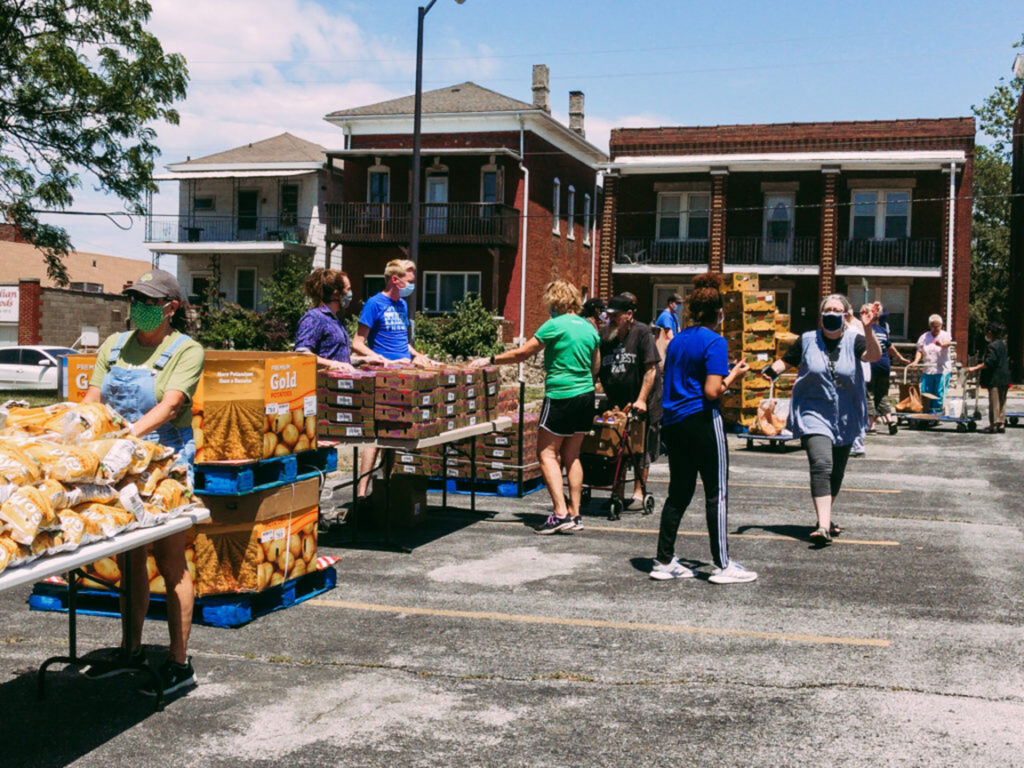
HELPING HANDS
As COVID-19 exacerbated the hardships of already struggling Kansas Citians, organizations in Northeast and throughout the city stepped up to offer a helping hand, oftentimes modifying their cancelled programming or creating new assistance programs.
Community Facebook pages filled up with offers to run errands or deliver groceries. Neighbors fostered pets when shelters scaled back operations, and patrons bought gift certificates at their favorite businesses and restaurants to help them stay afloat.
J. Rieger Distillery and Kansas City Canning Company, both located in the East Bottoms, pivoted their business models and began producing hand sanitizer, which was distributed widely to businesses and residents of the community. Less than an hour into the announced distribution by J. Rieger, KCPD Traffic Units had to be deployed to re-route and direct traffic as the line snaked almost a mile west on Guinotte Avenue. Later during August, J. Rieger donated 400,000 face masks to the City to be distributed by first responders and health officials.
The Don Bosco Senior Center suspended midday meals and social activities for seniors at its Columbus Park center, but began delivering more meals than ever to senior citizens in need. Although the grand opening of the new Don Bosco Community Center down the street was delayed, the Sewing Labs, a local non-profit moved into the basement space and began sewing masks with help from the community. The senior center continued to act as a monthly distribution location for a fresh produce Mobile Food Pantry in partnership with Harvesters Community Food Network. With the help of Central Bank of Kansas City on Independence Avenue, groceries and cash donations were delivered to senior citizens in April.
Throughout the warmer months, trash clean-ups were well attended as community members embraced the outdoors and focused on bettering their parks, alleys and neighborhoods.
Eleos Coffee at Independence Ave. and Indiana temporarily suspended their retail operation to focus on meeting the needs of at-risk community members as well.
The Independence Avenue Community Improvement District (CID) has distributed sanitizer, wipes, gloves, signs and thousands of masks throughout the pandemic to local businesses and pedestrians along the Independence Avenue corridor. Due in large part to the marketing efforts and support of the Northeast Kansas City Chamber of Commerce and the CID, no businesses in their districts have failed, an unprecedented feat that should be celebrated.
Despite COVID restrictions, the Chamber and the CID continued their Northeast Mural project, cutting the ribbon on a new six part original mural in 2020 facing a once-troubled alley behind the BP station at 4815 Independence Ave.
Schools around the metro scrambled to provide internet and technology to students, dedicated to keeping their education on track as much as possible. Frontier Schools, a local Charter School system, created face shields with 3D printers to donate to local hospitals. From socially distant home visits to food distribution, KCPS and others stepped up to meet the need.
The Mattie Rhodes Center at 148 N. Topping began ramping up their emergency food assistance for families in need in April, and is still going strong as the year comes to an end. They have distributed thousands of meals to the community since May.
By August, the city’s Parks Department was offering up community buildings as virtual learning sites for students for the upcoming school term.
A website was set up to connect Kansas City businesses with resources for hard to find personal protective equipment (PPE) in May.
Local healthcare centers Samuel U. Rodgers and KC Care Health Center, both serving low income and under-served populations, provided drive-thru testing, telehealth visits and resources. Early on, both had focused their limited resources on testing the area’s most vulnerable populations.
As summer began to heat up in June, Bishop Sullivan Center on Truman Road provided seniors with air conditioners through Project ElderCool. Many cooling centers, like the North-East Branch library remained closed due to the ongoing pandemic.
As the holiday season approached and the pandemic showed no signs of abating, Della Lamb and Healing House passed out turkeys, holiday supplies and toys to community members ahead of Thanksgiving and Christmas. Della Lamb’s Operation Holiday was modified this year, but with the help of Missouri National Guard recruiters and volunteers, the drive-thru event helped hundreds of Historic Northeast residents.
Sheffield Place, the cornerstone of the Sheffield Neighborhood that assists and mentors homeless mothers and their children, began renovations on the former convent dormitory for the former St. Stephens Parish, now Our Lady of Peace, in order to grow their capacity and expand their operations.
The Northeast News staff was blessed with the generosity of our community throughout the pandemic, but especially when our neighbors were called upon to support local journalism. Our loyal advertisers, supporters and readers are the reason we’re still here, and our team remains committed to providing award winning Community Journalism to our readers.
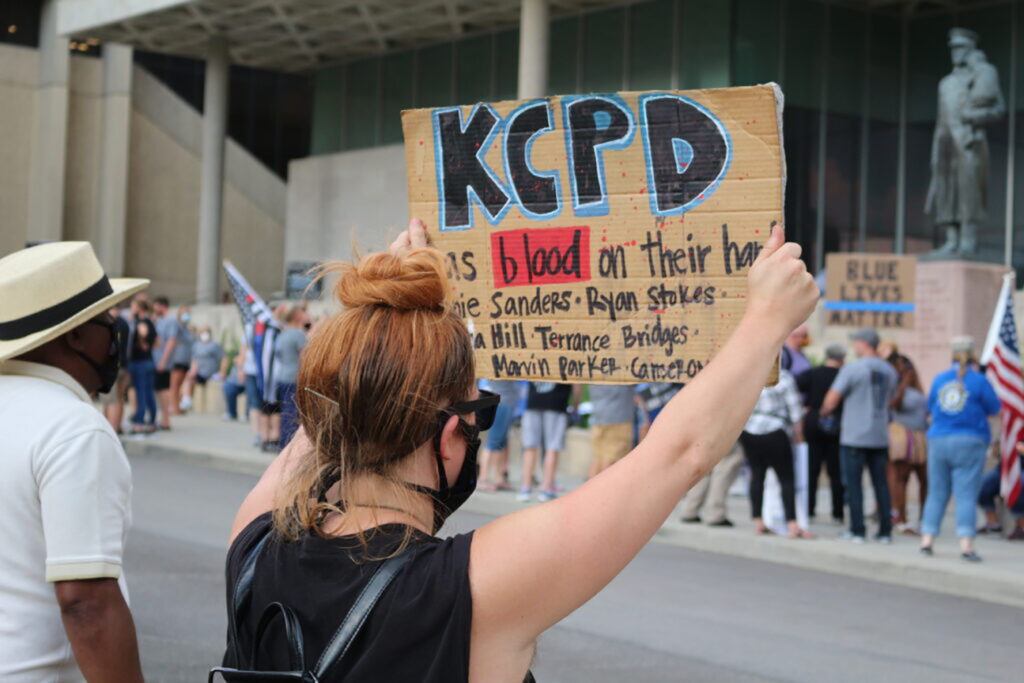
RACISM
In 2020, the struggle for human rights, equal representation and police reforms were highlighted by events that sparked protests throughout the nation. Northeast residents were confronted with difficult conversations surrounding racism and the disparities found in education, housing and resources in urban core areas.
In February, the Northeast News honored Black History Month by featuring Black-owned, refugee and immigrant businesses in the community, like Muhubo Jama, owner of Jama Imports at 6th and Prospect. Ted Davis of Ted’s Barber Shop has been cutting hair on Independence Avenue for 16 of his 36 years in the business and was recognized by former Mayor Mark Funkhouser as being the first Black-owned barbershop on Independence Avenue.
We were excited to share the history of famous Black Kansas Citians like Sarah Rector, Kansas City’s first Black millionairess whose stately brick home still stands near 12th street and Brooklyn Avenue, or Lafayette Tillman, the city’s second Black policeman, Monarchs great Buck O’Neil Jr. and many more.
As small businesses struggled to stay afloat, local leaders sought diversity data in SBA loans and CARES Act funding.
“Inequity is built into the system,” said U.S. Congressman Emanuel Cleaver II (D-MO). “When you consider Black and brown small business owners, they were excluded for a variety of reasons. One, they didn’t have relationships with big banks.”
Following the death of George Floyd, who died after being forcefully detained by Minneapolis police officers, protests erupted nationwide calling for the protection of Black lives and police reform. Daily protests began in Kansas City on May 29, and continued weekly through the end of the year. Northeast News Editorial Assistant and UMKC student Daisy Garcia Montoya was on the scene when protesters rallied at City Hall in June when Latinx advocacy group Voz KC joined the Black community in solidarity. Montoya embedded with a local LatinX group and covered the story when they marched from downtown to the city’s West Side.
In June, Parks and Recreation Board Commissioner Chris Goode presented a letter to his board requesting the renaming of J.C. Nichols fountain and parkway. The fountain’s home, Mill Creek Park at J.C. Nichols Parkway and Emanuel Cleaver II Boulevard on the Country Club Plaza, was the site of protests in the weeks following Floyd’s death. J.C. Nichols developed neighborhoods in the early 1900s with covenants designed to effectively keep Black Kansas Citians out of certain neighborhoods. Public hearings were scheduled to discuss the name change to honor Martin Luther King Jr., which was widely contested. The Nichols family voiced support for the movement “for the greater good of the city” they love. The resolution to remove his name passed unanimously, but it was ultimately not replaced with King’s.
The Northeast News continued to cover the name change debate happening on Paseo Boulevard. In 2017, the City Council voted 8-4 to rename The Paseo to Dr. Martin Luther King Jr. Boulevard, but when put to a city-wide vote nine months later, thanks to an exhaustive signature petition advanced by Save The Paseo advocates, nearly 70% of voters were in favor of the original name returning. Many street signs along The Paseo that were changed following the council’s vote were removed and the city worked in June 2020 to re-install The Paseo signs, costing the City $60,000 to install new signs, and then $40,000 to change it back to The Paseo.
“Last fall Mayor [Quinton] Lucas tasked the Parks Board of Commissioners with finding a way to honor Dr. King,” according to the parks board. “The current pandemic put a halt to the department’s plans to engage residents in works, however it did not halt progress on this topic.”
The Southern Christian Leadership Conference of Greater Kansas City made a formal recommendation in August to the parks board to honor King with a stretch of road now known as Blue Parkway starting at 55th Street, Swope Parkway and Volker Boulevard. Both the new airport terminal and 63rd Street were suggested to honor King. The board held two public hearings on the proposal, but at the end of 2020, Kansas City remains one of the only major metropolitan areas in the country without a street named for the civil rights leader.
Elected officials, organizations and City departments pushed for residents, especially in urban core communities, to participate in the 2020 census, which affects federal funding for the next 10 years. Lucas said the low response rates, which are in majority Black districts, gave grave concern because it relates to how resources are allocated for things like housing and public works.
“The greatest thing about the Fourth District is how diverse we are, and I want to make sure that diversity is shown through by our participation in the census,” Councilman Eric Bunch said.
In July, as calls for police reform persisted in Kansas City and nationwide, supporters of the Kansas City, Missouri Police Department (KCPD) gathered outside the department’s downtown headquarters, and the counter protesters across the street. The Northeast News objectively reported on both groups, who remained nonviolent for the duration of the demonstration.
In August, a $45,000 Trust for Public Land Grant was awarded to the Kansas City Museum Foundation to be used for Northeast parks as part of the 10-Minute Walk program, which seeks to ensure that all residents have safe, equitable access to a quality park or green space by 2050, something that is often lacking in urban core areas.
Black Lives Matter street murals were approved to be painted in six locations across the city on August 6. A local Back the Blue group also submitted a request to paint their message on city streets, which was effectively ignored by City Council. The snubbed group protested the decision, calling for fair treatment. In December Public Works Spokesperson Maggie Green said the city is working to create an application process for any street murals moving forward.
In September, Kansas City Public Schools (KCPS) shared a report of the staggering impact tax abatements have had on the district, pushing for incentive reform.
“Members of the City Council, as well as business leaders, have stood up in the recent weeks to say Black Lives Matter,” Bedell wrote in June of 2020. “I commend them for doing so, but as the adage goes, actions speak louder than words. If Black Lives Matter to you, then so should the schools south of the river.”
Bedell noted that public school funding is constantly under attack, but even through the pandemic, the school supplied multiple meals a day for all Kansas City kids in need, sourced technology for students, offered trauma-informed support, and secured resources for families dealing with homelessness.
As many of these issues are left unresolved at the year’s close, the Northeast News will continue to tell these stories, highlighting groups that focus on supporting immigrant, refugee and marginalized communities, and cover human rights issues and disparity in Kansas City.
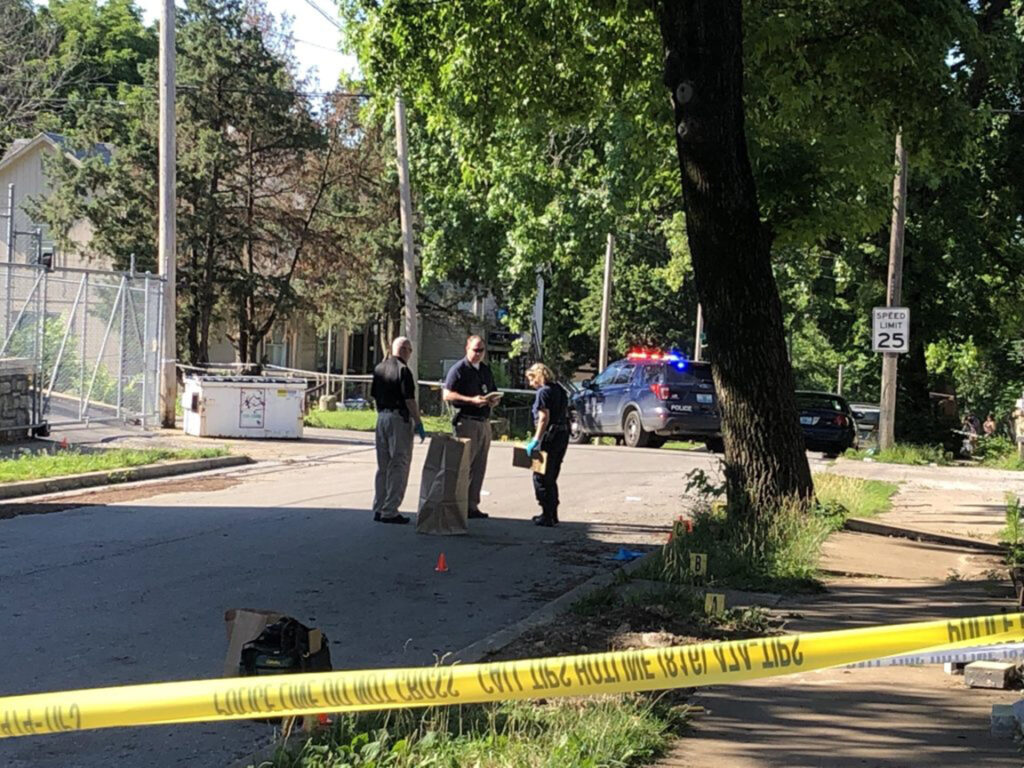
CRIME
It’s hard to summarize the past year in Northeast, let alone Kansas City, without including the high rate at which our community experienced homicides and other violent crimes.
On March 3, the Northeast News covered the first Northeast homicide of the year in the Hardee’s parking lot at Independence Avenue and Winner Road. It was followed the next day by a gang-related murder at 10th and Brooklyn, where two people were charged.
From then on, sometimes days or only hours passed between homicides. On Thursday, July 2, two officers and a KCATA bus driver were shot within hours of each other. The ATA incident occurred at Independence Avenue and Hardesty.
By June, the city had 72 shooting victims, compared to 65 in June 2019. The first week of July had an additional 12 bullet-to-skin shootings, and a 39% increase in homicides over last year.
Beginning in the summer, the East Patrol Division of the Kansas City Police Department (KCPD) began a saturated patrol in Northeast, reallocating manpower and resources to the area. At that time, East Patrol had approximately 43% of the city’s homicides.
In July, Kansas City Mayor Quinton Lucas called on Missouri Governor Mike Parson to convene a special session of the Missouri General Assembly to address violent crime. Later in the month, Parson met with representatives from KCPD, Jackson County Sheriff Darryl Forté and local leaders at East Patrol Division to discuss the city’s violent crime. Missouri had experienced more homicides in the first seven months of 2020 than it did in all of 2019.
Parson called a special session of the Missouri General Assembly. The special session, which began July 27, focused on amending state statutes related to violent crime. Six provisions were set to be considered: police and public safety employee residency requirements for St. Louis, juvenile certification, witness statement accessibility, witness protection fund, endangering the welfare of a child, and unlawful transfer of weapons.
On July 8, United States Attorney General William Barr announced the launch of Operation Legend, “a sustained, systematic and coordinated law enforcement initiative across all federal law enforcement agencies working in conjunction with state and local law enforcement officials to fight the sudden surge of violent crime beginning in Kansas City, MO.”
The operation was named for 4-year-old LeGend Taliferro, who was shot and killed in his sleep on June 29 in Kansas City.
Over 100 Department of Justice agents were sent to Kansas City to work alongside state and local agencies. Some Kansas Citians were concerned about federal agents joining a police force that they feel they already do not control. The debate about local control persisted throughout the summer, and was a key element of ongoing protests.
When Barr came to Kansas City to provide an update on Operation LeGend, Kansas City had 124 homicides. In the first four weeks, the operation led to 18 arrests and the seizure of over 70 illegal firearms.
Roughly thirty Independence Avenue stakeholders and community members met Thursday, July 23, at the offices of the Independence Avenue Community Improvement District (CID) to address the uptick in crime along the Avenue Corridor, specifically at locations where violent crime is on the upswing.
Mayor Quinton Lucas, department heads and stakeholders toured both Lykins and Sheffield neighborhoods as part of the City’s new anti-crime initiative, the Reform Project KC. Residents voiced concerns about lack of resources and ongoing problems, while advising how the City could support their programs and initiatives already in place.
In November, the mysterious 1989 death of Fawn Cox was finally solved using advanced DNA testing. The 16 year old was killed in her bedroom of the family’s home near 9th and Van Brunt Boulevard. The murderer climbed up to and broke through her window before sexually assaulting and strangling her, while the rest of her family slept. The mystery, which haunted her family, community and KCPD officers who worked the case, was finally solved when federal resources were made available in Kansas City as part of Operation LeGend. Nearly 30 years later, the results revealed her rapist and killer to be Donald Cox Jr., her cousin, who died in 2006.
Throughout the year, the Northeast News compiled a list of homicide victims in Historic Northeast, landing at 31 by the end of 2020. Many of the victims were young men, but crime didn’t discriminate. By December 28, it seemed Kansas City would end the year with 180 residents dead by homicide.

FEATURES
Like we have been since 1932, this year the Northeast News was honored to tell the stories of the people who make up the diverse and historic Northeast community through our feature stories and Faces of Northeast column. At the onset of the pandemic, when events were being cancelled left and right and a stay-at-home order was imposed, we featured hobbyists, artists and creatives who live in the community. From sewing masks to baking bread, dancing on their lawns, gardening, painting and playing music, residents of Northeast got creative. We told the story of Tony Liotta, an Italian immigrant whose passion for gardening and feeding his neighbors has led him to being the unofficial mayor of his quiet street. That same week, we were excited to welcome back Scimeca’s as they continue the family legacy of the old Italian neighborhood deli. We mourned the loss of local historian Dory DeAngelo, and chronicled when longtime – 65 years, mind you – Avenue barber Joe Vento retired. Lifelong resident and Senior Olympian Ray Kopek (who has run more stairs at the Concourse than all of us combined) shared his success with us. We walked the Avenue with Christine McDonald, a victim of commercial sexual exploitation, as she reached out to prostituted women, and we were there when Christine’s Place opened to provide resources to those women. Bobbi Jo Reed, founder of Healing House, finally had her story told on the big screen when a documentary was made about her work helping others overcome addiction in Northeast. These people and so many more make up the fabric of our community, and telling their stories has been and will always be our honor.
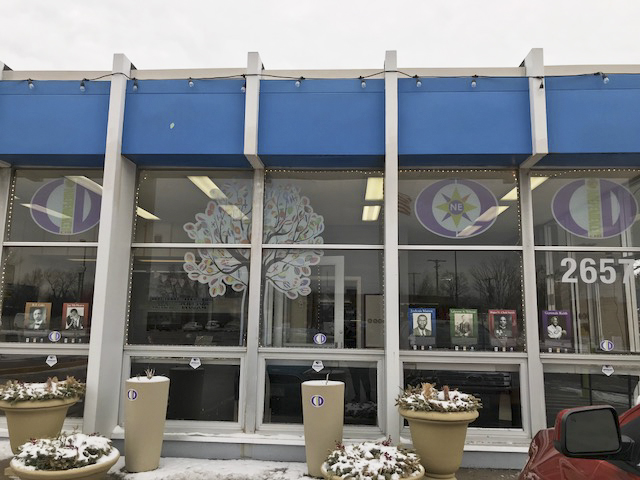
NORTHEAST GOES VIRTUAL
As indoor gatherings became more dangerous when COVID-19 began to spread here in March, Kansas Citians transitioned to meeting virtually. Neighborhood associations, community groups and classrooms all transitioned to video conferencing. Forums and workshops, including many at the Northeast Chamber of Commerce, also moved online to gather community input and start conversations with residents.
Schools were closed by Mayor Lucas’ Executive Order on March 15, and many parents were suddenly responsible for their children’s education at home. Northeast News Publisher Chris Adams, a retired high school teacher, offered advice to struggling and stressed out parents: provide structure and relax when feeling overwhelmed.
As the deadline to file taxes was extended, Liberty Tax on Independence Avenue began offering virtual tax assistance. Customers were able to call staff members for immediate assistance, file taxes online, get remote tax preparation with Virtual Tax Pro, or even drop off tax documents at a Liberty Tax location and allow experts to do the rest. Transitions like this were seen in businesses along the Avenue as a testament to the Northeast small business community’s commitment to their patrons.
April saw the return of the Kansas City Public Library’s Signature Events, which provide discussions revolving around authors and other speakers. In October, the library began offering free virtual writing classes and hosting a virtual story time.
Other cultural centers, like the Kansas City Museum, which is wrapping up a years-long renovation project, hosted online events throughout the year. Virtual Museum Day in May was hosted by a group of Kansas City museums – the Truman Presidential Library, the American Jazz Museum and the Nelson-Atkins Museum of Art premiered new videos and live streams for the audiences that museum educators have missed due to the temporary shuttering of their on-site programming due to COVID-19 restrictions. Day of the Dead celebrations in Northeast, usually well attended and colorful parties, took a somber tone this year as the Kansas City Museum scaled back its festivities to include an outdoor, socially distant altar viewing memorializing victims of COVID-19. The museum and Mattie Rhodes hosted virtual discussions about the history and importance of the holiday.
Mattie Rhodes hosted a Latinx-focused web development course as the inaugural event in the blossoming career program. The center looks forward to hosting virtual youth career readiness tutoring after the first of the year. Mayor Quinton Lucas worked with HireKC to move internships online, making them more accessible for students, in May. However, low income and disadvantaged residents felt the need when it came to technology and internet access, whether for learning and working from home, or seeking help.


